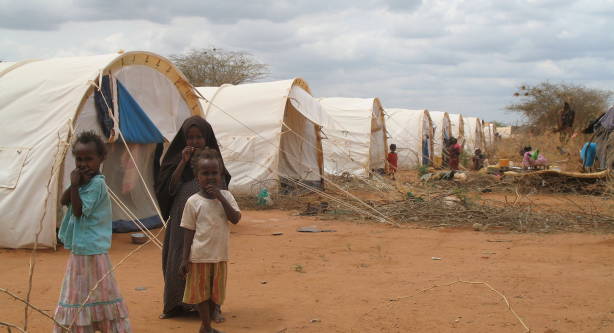
It's almost five years since I arrived to live and work in Kenya. Gradually the feelings of excitement and adventure have given way to a sense of deja vu as the same stories come around again and again. Every year there are warnings of famine in Ethiopia. Every two years there is drought in north-eastern Kenya. And Somalia is on a constant slide into the abyss. Eventually the wide-eyed reporter becomes tired and jaded. (I had always been cynical, but that's a different story.) It's a gradual process that takes place unnoticed over years.
Then something comes along to make you realise it is hampering your ability to do the job. That moment came for me last week, during a trip to Dadaab - the world's largest refugee camp, where 280,000 Somalis live. As I interviewed new arrivals it dawned on me that nothing much had changed since my previous visit three years ealier. Refugees were still flooding across the border. Islamists were battling for control of Mogadishu. And the world had little idea what to do, beyond sending arms and ammunition to anyone killing Islamists.
I filed my copy and came home. A couple of days later I looked up what I had written on that earlier visit. I thought it would be interesting to compare and contrast. What I found was a reporter running out of ideas.
This is what I wrote in August 2006...
They are arriving in droves, on foot, by donkey, or in matatus - the crowded minibuses that crisscross Somalia's border with Kenya. Some 18,000 refugees have left their homes in Somalia this year for Dadaab's sprawling city of sticks.
And this is my June 2009 version...
They are coming in ones and twos, families and friends, on donkeys and in trucks, dressed in the clothes they were wearing when the mortars landed or the battlewagons buzzed through the streets outside their homes. Thousands of Somalis in search of safety are arriving at an overcrowded aid camp over the border with Kenya in search of safety.
The story has changed little, sure. Only the numbers are any different - the camp has doubled in size during those three years. But it is time to move on when it seems as if you are trying to fit what lays before your eyes into some preconceived pigeon holes. I had used similar imagery to fashion intros that were just too alike. So at the end of this month I'm packing up my books and pictures and heading back to the UK to freshen my tired eyes and find a new place in the world.
Somalia will remain a mess and Kenyan nomads will keep losing their cattle every couple of years, but it is time for someone else to tell their stories.

I reckon I've pretty much scooped up every last English language blog in Cameroon - linked them via my own and added them to my blogroll.
I've noticed that even the amateur writer reaches a point whereby the incredible becomes the run of the mill.
When young Peace Corps arrive or VSO volunteers, their blogs are full of tales of eight people in a taxi and goats running wild on the main shopping street or whatever.
Then you suddenly realise that you haven't seen an update in a couple of months and eventually when it arrives it comes with an apology for not updating sooner but also with the explanation that they had run out of inspiration. Eight people in a taxi was no longer surprising, goats on Commercial Avenue happens.
And that is just day-to-day stuff.
I suppose the reason why people often talk of famine, wars, refugees in Africa of being under reported is that quite often it suffers from the same issues. It's not news in the sense that people have heard it before. It's not surprising. It's not what people are going to talk about at work the next day.
And to be in the middle of that reporting on it - it must be hard not to repeat yourself. Hard to keep being moved by it and even harder to convey that.
I still cringe from the pronouncements of new volunteers here - "Cameroonians are poor but happy" (I don't see it) one Belgian volunteer said..."I thought I'd see more people with drums".
But there's a fine line between fresh faced naivete/ignorance and reaching a state where you know the problems so well that even in empathising you are going through the motions.
Truth is, for me, I've never fallen in love with Cameroon. I waited for it to happen and it was months and months in before I gave up on the idea and concentrated instead of simply finishing my (just one) year long stretch.
In a country so disenfranchised and unempowered by its own corrupt government I see apathy all around me and very little belief that there can be any improvements.
It's hard to love a country that even its own people don't love.
There's two months left and then I'm leaving. What little can be achieved by grass roots volunteers like me doesn't equate to what could be done by governments - not just the Cameroonian government but others in Europe and North America through pressure to force change. We talk of "bottom up" development a lot with VSO but the truth is Cameroon needs top down first.
I think five years is a very admirable stint. With most countries I have surprised at how I've looked back at them so fondly. I am sure you will do too in time. I'm not sure I could say the same of Cameroon.